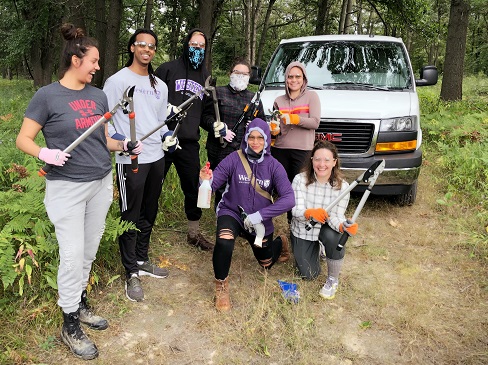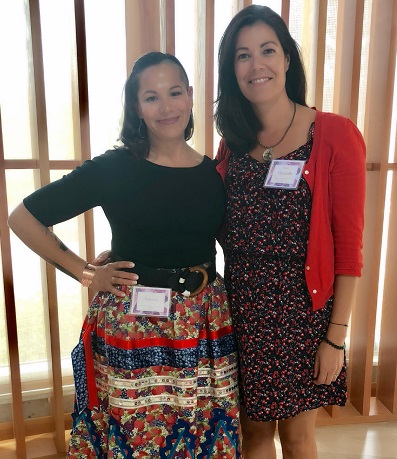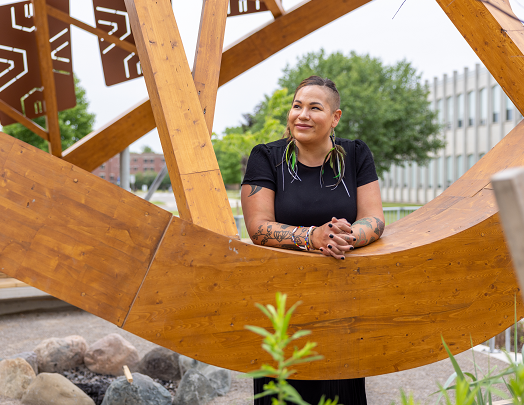Peace and purpose
A health equity advocate, Vanessa Ambtman-Smith gives back to the Indigenous community that healed her.
By Cassie Dowse

The word that can perhaps best describe Vanessa Ambtman-Smith, PhD’23, and newly appointed faculty member at Western, is survivor. Weathering a storm that enveloped her in darkness, Vanessa found peace and purpose in the culture of her community, and an eternal bond to the natural environment. As a scholar and professor, she advocates for health equity for Indigenous Peoples.
“The effects of colonialism continue through structural inequities and systemic racism,” says Vanessa. “My doctoral research shows that Canada’s health-care system must rebuild trust amongst Indigenous populations by incorporating Indigenous healing practices and spaces into patient care. With the mental health-care system in crisis, lives are hanging in the balance. We don’t have time to wait.”
Vanessa (Niizhobinesiik, Thunderbird Clan) is of Nêhiyaw-Métis ancestry. In a decades-long journey battling insidious racism, poverty and addiction, Vanessa has emerged strong and steadfast in her mission to make vital change for Indigenous Peoples. Completing her PhD in geography and beginning a new role as a professor at Western, Vanessa hopes to guide students down a path that fully recognizes the humanity of her people.
Vanessa is an Indigenous adoptee part of the Sixties Scoop – the mass removal of Indigenous children from their families into the child welfare system. She spent the first five years of her life on Treaty 6 Territory, but moved and was primarily raised on Treaty 1 Territory (Winnipeg). Growing up, Vanessa observed that many Indigenous relatives lived in poverty, visibly suffering from addictions, mental health challenges and intergenerational trauma.
In her youth, Vanessa was routinely subject to overt racism which shaped the way she saw herself and limited her opportunities. She could not understand the extreme divide in how Indigenous Peoples were treated. Reflecting on this divide, Vanessa muses, “I could not make sense of these inequities, and when I questioned why this was, no one was able to give me a good answer. This is why I chose to pursue a post-secondary degree in Native Studies – there had to be answers about why there was such a visible problem.”
Vanessa repeatedly saw the health-care system fail her community, denying them the care they desperately needed. “If they were able to access care at all, the treatment options were very limited and focused on conventional medicine, and hospitals were not safe environments. Many lives were cut tragically short.”
Attending a private high school, Vanessa learned a version of Canadian history that systematically erased Indigenous stories, languages and cultures, proliferating denial of colonialism and hiding atrocities committed at residential schools.

“Canadians were painted with a benevolent brush and there was very little mainstream knowledge about why the inequities are so pervasive,” says Vanessa. “The Royal Commission on Aboriginal Peoples had just begun, and there was no Truth and Reconciliation Commission to recognize the harm done by the residential school system. Because I didn’t know the honest and accurate history, I was very confused.”
In a dark place and disconnected from her culture, Vanessa couldn’t see hope for her future. She felt no sense of belonging as she moved around to different cities in Ontario during her twenties.
“I was very sick, struggling with addictions, and internalized the stereotypes – that Indigenous Peoples are incapable of taking care of ourselves. I didn’t understand that the health-care system, and certainly many societal institutions, were not built to support our holistic care needs.”
Vanessa feels her experiences as a patient in hospital are reflective of how Indigenous Peoples have been treated for decades at institutions that did not provide safe, culturally appropriate health care, and instead inflicted trauma. These experiences, which are still difficult for Vanessa to reconcile, illuminate the dangers associated with negative stereotyping.
“The attitudes of indifference and the stereotypes allotted to Indigenous Peoples – that we’re drug seeking and alcoholic – deny access to the care we need,” says Vanessa. “It reinforces a harmful cycle.”
A large part of this needed change is recognizing the value of combining natural medicines and spiritual connections to the ecosystem as part of conventional medical care – including safe spaces for Indigenous patients to practice ceremonies and more education for health-care providers.
A journey to recovery
For Vanessa, academic and traditional education saved her life. Moving to Ontario to attend Trent University as an Indigenous studies undergraduate student, she started to make sense of the traumatic experiences and circumstances that were so familiar to herself and those in Indigenous communities across the country.
Invigorated by a journey of self-discovery and cultural revitalization that connected her back to the natural environment, ceremony and culture, Vanessa began her recovery from addiction. It is then, she says, that her life began.
“Attending university shut down the harmful narratives that I had internalized,” says Vanessa. “For the first time, I understood that we were denied our knowledge base built up over thousands of years where we know how to live successfully, to be healthy, and to steward the lands and waters so that they continue to be available to support generations ahead.”
After working for two decades in health-care leadership, Vanessa continued to see Indigenous patients treated improperly and sought advice for how she could use her position to make the greatest impact. Consulting with Elders in her community, the instructions were clear – she was to pursue graduate studies and commit herself to scholarly work that would address the issues from a unique position with cultural knowledge and respectful evidence-based research.
“Our community understands how to take care of ourselves, but not everyone has come into that knowledge,” says Vanessa. “That’s why we rely on the Knowledge Keepers and Elders, who carry forward those solutions from our ancestors. My job is to help make safe spaces within health care so that we can continue to build on that movement.”
While nursing her second child, Vanessa sought answers about how to best support Indigenous health and returned to graduate school. After a resoundingly negative experience at university in western Canada that forced her early withdrawal, she felt compelled to finish what she started. While living close to Western University for several years, Vanessa heard about Anishnaabe scholar and faculty member Chantelle Richmond, who runs the Indigenous Health Lab. After meeting with professor Richmond, the stars aligned and Vanessa knew her future was at Western.
“Chantelle has been an incredible mentor, and she’s also changed my perspective on conducting Indigenous research. Rather than focusing on the doom and gloom of Indigenous health, she has encouraged me to direct my attention towards the hopeful and helpful, reframing my view through environmental repossession so that we can continue to move forward in a positive way.”
Taking non-Indigenous people on that journey is also a responsibility Vanessa takes to heart, valuing allyship in changing approaches to health care and using positions of power and privilege to combat negative stereotypes. “I’ve found that people are hopeful and eager to learn. They want to course-correct, and I want to educate and support them to be a good ally,” says Vanessa.

Donors contribute to a more equitable world
In 2020, Vanessa was recipient of the Dr. Valio Markkanen Indigenous Graduate Awards of Excellence. The award is bestowed annually to an Indigenous graduate student who has achieved excellence in academics and actively contributes to the Indigenous community. The award couldn’t have come at a better time for Vanessa and her husband, who were dealing with the challenges of the pandemic, remote schooling for their two children and the responsibilities associated with pursuing graduate studies and conducting research.
“I had to leave my career and return to school as a mother. It feels so important that donors are invested in my success and believe in what I want to do. Beyond interest in my work, donor giving gave me a level of financial stability, so that I didn’t have to fight every day to be a student.”
Additionally, Vanessa has received coveted national scholarships from the Pierre Elliott Trudeau Foundation, and the Vanier, a Canada Graduate scholarship. She was also awarded a provincial scholarship through the Indigenous Mentorship Network, Ontario, and was an Ontario Graduate Scholar.
“I would say to anyone who supports scholars and their journeys, how profoundly grateful I am. It has given me a deep sense of respect and dignity, and it reminds me that my work is a shared collective responsibility because there’s a stake in it for others as well.”
Resolution and revitalization
The winding journey Vanessa has had is not lost on her. Looking back on her experience, she never imagined that she’d be where she is today. With astounding strength in sharing her story, Vanessa sees it as key to connecting with others to show them that hope exists.
“It’s hard to speak publicly about my trauma. But I know what it feels like to live without hope, and with the mental health-care system in crisis, I want people to know that they have options and that they are capable and valuable. There is a compelling reason why I am here, and I want to show people that you can overcome your circumstances.”
As a professor in the Faculty of Social Science, Vanessa holds a joint appointment with the department of geography and environment, and with the Indigenous Studies program. Vanessa says that becoming an academic and a scholar is beyond her wildest dreams, and she looks forward to developing as a mentor for her students.
“I am so proud to be part of the generation that re-educates people to recognize that we have value and that we are worthy. The opportunity to conduct safe, respectful and meaningful Indigenous research is all I have ever wanted to do,” she says.
Vanessa also sees her role as a mother integral to her drive to make the world a better place for Indigenous Peoples and communities across the country.
“My daughter was three months old when I started a graduate degree. She and my son watched me work hard for the past six years, and that example is important to me. I don’t want my own children to have to fight for their human rights. I want them to know that everything is possible.”

This story is featured in Western's 2023 Annual Impact publication. You can also read here about how Vanessa's story helped inspire a legacy gift from Mira Ratkaj, BSc'85.










